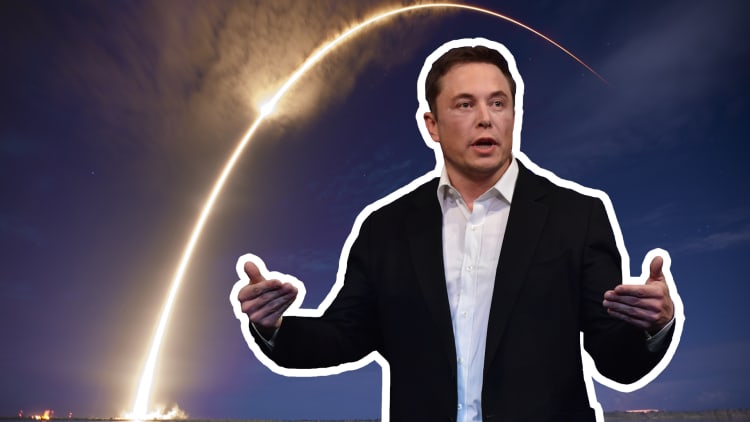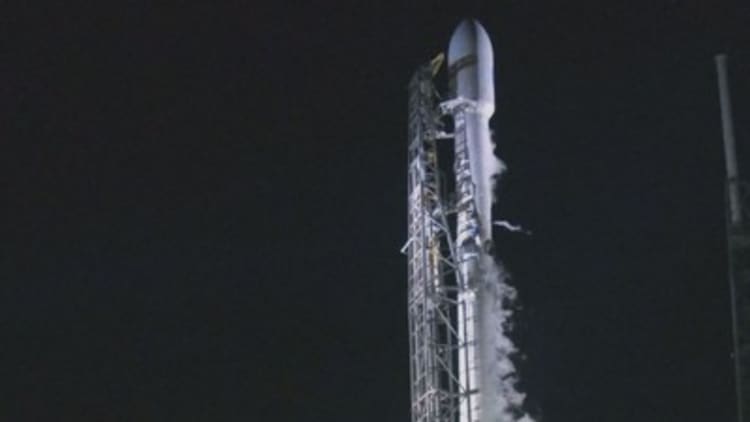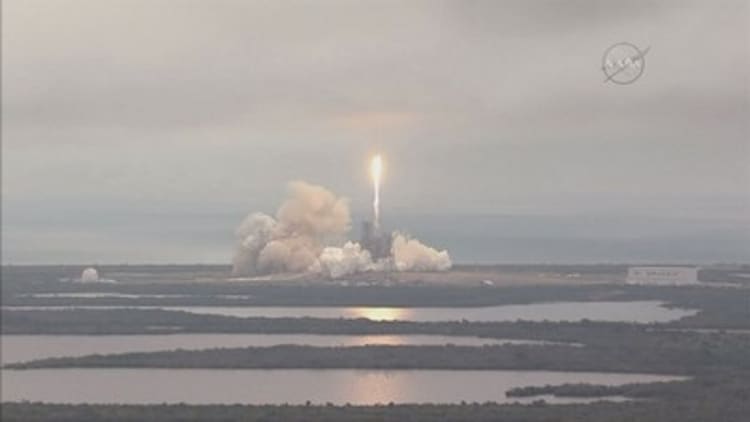The U.S. Air Force awarded rocket launch competitors SpaceX and United Launch Alliance each hundreds of millions of dollars in new satellite contracts, the Department of Defense announced Wednesday.
SpaceX won a $291 million fixed-price contract to launch a military GPS III satellite by March 2020 aboard a Falcon 9 rocket, with an option included to launch two more. At $96.8 million per launch, the cost of these latest awards are in line with the two previous GPS III launches SpaceX won in April 2016 and March 2017, for $87.2 million and $96.5 million each.
"SpaceX is pleased with the Air Force's decision to select us for all five of the GPS III missions competed to date," Gwynne Shotwell, SpaceX president and COO, said in a statement.
ULA — a joint venture between Boeing and Lockheed Martin — won a $355 million fixed-price contract to launch two Air Force Space Command (AFSPC) satellites. The company will launch one satellite aboard an Atlas V rocket in March 2020 and the other in June 2020, the Air Force said.

"The competitive award of these two ... contracts directly supports Space and Missile Systems Center's mission of delivering resilient and affordable space capabilities to our nation while maintaining assured access to space," Lt. Gen. John Thompson, of the Space and Missile System Center at Los Angeles Air Force Base, said in a statement.
When SpaceX won its previous GPS III contract last year, Thompson's center said the company's lower price "was a major factor" in beating out ULA for the contract. Once again, with ULA's most recent contracts valuing each launch at $177 million, SpaceX's bids came in at nearly half the cost to the military as its competitor's.
ULA chief executive Tory Bruno confirmed his company and SpaceX were the "two offers" the Air Force received for the three available contracts — one for the GPS III satellites and two for the AFSPC satellites.
"If you're keeping score ... it's 5 [SpaceX] wins versus 6 ULA wins," Bruno wrote in tweets.
@torybruno: 5 SX wins vs 6 ULA wins (bids). 7 F9s vs 6 Atlas'
Before SpaceX began launching (and landing) its rockets, ULA had a monopoly on U.S. military satellite launches. With both of SpaceX's Falcon 9 and Falcon Heavy rockets listed at prices far below comparable ULA rockets, the primarily government contractor is pushing to develop a new range of offerings to compete — but those are still several years away from test flights.
With Elon Musk's space company continuing to prove its reliability, the Air Force is making it clear that the rocket-launching business is entering a new era of competition.
"We're coming to a point [where the lower cost to launch is] enabling business plans to close in space that never were possible before," Air Force Secretary Heather Wilson said at a congressional subcommittee hearing Wednesday.
The successful launch of Falcon Heavy earlier this year will reportedly be followed by its first flight for the Air Force, known as Space Test Program 2. As Falcon Heavy has yet to complete the certification process to launch military equipment, the Air Force is using the launch to demonstrate the rocket's capabilities, while also delivering commercial satellites for companies such as Inmarsat and Viasat.
Billions yet to be awarded to manufacture GPS III satellites
There is also as much as $10 billion in Air Force contracts up for grabs to produce the 22 next-generation GPS III satellites. Lockheed Martin won the first phase of the contract in 2008 but suffered delays due to issues with the satellite's navigation payload.

Frustrated by the delays, the Air Force opened the bidding for the second block of GPS III satellites, although Lockheed still has a deal to build up to 10 satellites. The current program, which also includes navigation payload supplier Harris, is about three years behind schedule so it has put added pressure on the Air Force.
In all, the Air Force wants a total of at least 32 satellites, all equipped with significantly improved anti-jamming capabilities and more accuracy than the previous generation of GPS satellites. The new satellites also are designed to increase military capabilities for war-fighting operations and the commercial market.
SpaceX adding to its $12 billion backlog
Maxar Technologies-owned satellite manufacturer DigitalGlobe also announced Wednesday it would launch the first satellites in 2021 for its new WorldView Legion constellation aboard two previously flown Falcon 9 rockets.
"We appreciate DigitalGlobe selecting two flight-proven Falcon 9's to reliably deliver their satellites to orbit," Shotwell said in a statement.
The leader of the commercial space era added this week's contracts on top of a mission backlog of over 100 missions, worth more than $12 billion. With the cost of access to space plummeting, some estimate the space industry will be worth nearly $3 trillion in the next three decades, thanks to a boom in commercial investment.
WATCH: SpaceX sending internet satellites into space in 2019

— CNBC's Jeff Daniels contributed to this report.


